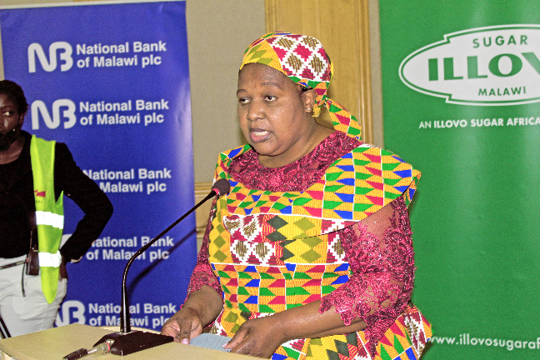
Agriculture
Malawi lagging behind in adopting agricultural technologies
October 21, 2021 / Wahard Betha

Deputy Minister of Agriculture Agnes Nkusankhoma has bemoaned the slow pace in adopting sustainable agricultural technologies by players in the industry.
Nkusamkhoma has, therefore, urged stakeholders in the industry to ensure effective coordination in different projects to scale up utilization of already identified technologies in order to increase quality and quantity of production.
She made the appeal during the Malawi Agriculture Innovation and Technology conference and exhibition which was held in Lilongwe courtesy of the Pan African Learning and Growth Network (PALGNET).
Nkusankhoma said the Ministry has so far conducted numerous studies on technology adoption, which have established that lack of coordination among players in the sector is a major stumbling block.
She said: “There is need, therefore, for more coordination across projects and among different players.
“I strongly believe that partnerships are fundamental to delivering the transformation potential of science and technology. There is need for partnership between government Ministries to ensure that our priorities are synchronized; partnership between government and the private sector will revitalize my Ministry and indeed other public institutions to carry out research.”
“Partnership with development partners will bring the much needed investment in our priority areas. Partnership with non-governmental organizations will ensure that simple technologies reach the most vulnerable people at the grassroots.”
Nkusankhoma also stressed that working in partnership will help in scaling-up innovations, and assist in deepening learning and sharing knowledge.
She said there is a need to build synergies and complementarities to get value for the investments that the players are making into the agricultural sector.
The Deputy Minister hailed the conference saying it has helped to provide a unique platform to nurture, develop and expand the partnership base that will promote use of technologies in the agricultural sector.
Nkusankhoma said; “This conference comes at a time when most African countries, including Malawi are still grappling with the slow adoption of science and technology in agriculture.”
“Over the years, cutting-edge and innovative technologies have been developed throughout the world to improve agricultural performance.”
“The application of science and technology continues to be the essence of what we all know as the Green Revolution in countries like India.”
“We, therefore, do not need to be convinced further that our endeavor to achieve Sustainable Development Goal Number 2 which aims at ending hunger and ensuring access to sufficient, safe and nutritious food by all people all year round requires that we join the rest of countries on this continent in adopting innovative technologies at scale.”
Nkusankhoma said application of scientific knowledge and use of simple technologies will make the nation attain aspirations of the Malawi 2063 on agricultural productivity and commercialization.
She reiterated the wishes of the Malawi Government to ensure that every smallholder farmer is supported by creating an enabling environment and supportive institutions.
Concurring with the Deputy Minister, Norwegian Church Aid and Dan Church Aid (NCA/DCA) Joint Country Director Havard Hovdhaugen said the NCA/DCA Joint Country Program strongly believes that collaboration within the industry is vital in establishing sustainable value chains.
Hovdhaugen said smallholder farmers, the private sector and the consumers, are critical components of the supply chain and that without collaboration the chain is incomplete.
He said: “The private sector plays an important role in strengthening the country’s food systems by providing smallholder farmers with access to inputs and markets.
“NGO sector is expected to play a catalytic role of mobilizing smallholders and introducing locally accessible inputs which will in turn generate demand to stimulate the interest of the private sector.”
“As an organization we want to collaborate with the private sector both as input suppliers and potential off takers so that some of the smallholders be motivated to now begin producing for the supermarkets.”
Hovdhaugen challenged all players in the sector to be innovative and come up with technologies that are simple, affordable, and easy to adopt, and let private sector work together with the NGOs for scalability.
The country director also disclosed that NCA/DCA strongly believes that NGO interventions in the sector can only be sustainable if the private sector is part of chain.
Agriculture sector remains the backbone of Malawi’s economy contributing 42% to the country’s gross domestic product (GDP) and 81% of export earnings.































